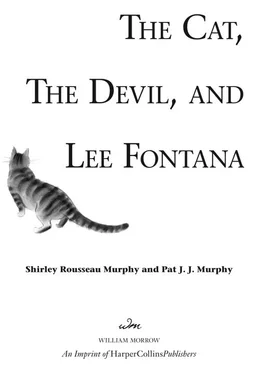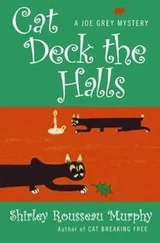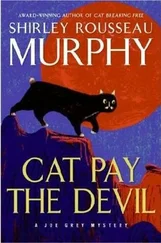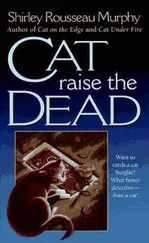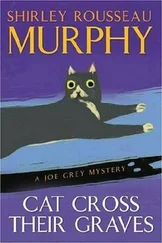Shirley Murphy - The Cat, the Devil, and Lee Fontana
Здесь есть возможность читать онлайн «Shirley Murphy - The Cat, the Devil, and Lee Fontana» весь текст электронной книги совершенно бесплатно (целиком полную версию без сокращений). В некоторых случаях можно слушать аудио, скачать через торрент в формате fb2 и присутствует краткое содержание. Год выпуска: 2014, Издательство: HarperCollins, Жанр: Старинная литература, на английском языке. Описание произведения, (предисловие) а так же отзывы посетителей доступны на портале библиотеки ЛибКат.
- Название:The Cat, the Devil, and Lee Fontana
- Автор:
- Издательство:HarperCollins
- Жанр:
- Год:2014
- ISBN:нет данных
- Рейтинг книги:5 / 5. Голосов: 1
-
Избранное:Добавить в избранное
- Отзывы:
-
Ваша оценка:
- 100
- 1
- 2
- 3
- 4
- 5
The Cat, the Devil, and Lee Fontana: краткое содержание, описание и аннотация
Предлагаем к чтению аннотацию, описание, краткое содержание или предисловие (зависит от того, что написал сам автор книги «The Cat, the Devil, and Lee Fontana»). Если вы не нашли необходимую информацию о книге — напишите в комментариях, мы постараемся отыскать её.
The Cat, the Devil, and Lee Fontana — читать онлайн бесплатно полную книгу (весь текст) целиком
Ниже представлен текст книги, разбитый по страницам. Система сохранения места последней прочитанной страницы, позволяет с удобством читать онлайн бесплатно книгу «The Cat, the Devil, and Lee Fontana», без необходимости каждый раз заново искать на чём Вы остановились. Поставьте закладку, и сможете в любой момент перейти на страницу, на которой закончили чтение.
Интервал:
Закладка:
It was stormy coming into Portland, the afternoon sky darkening, the streets slick with rain. Ignoring the drizzle, he moved out into the train’s vestibule where he could get a good look. The streets were busy with fast, slick cars, so many of them, kicking up water along the gutters, streets lined with impressive new buildings sandwiched in between the comfortable old brick-and-stone structures from an earlier time. The train slowed approaching the three-story station, its peaked roof and the tall, handsome clock tower stark against the gray sky. But far ahead beyond the city, light streaked the sky where the storm looked to be clearing, to be moving on north passing over the train. The station lights glowed, the neon signs announcing, UNION STATION. GO BY TRAIN. Stepping back to his seat, he made sure his wrapped sandwiches were in plain sight on his two seats atop his neatly arranged newspapers, hoping to mark his occupancy.
Moving down the metal steps and into the station, he stood staring around the vast terminal, looking up at the high, domed ceiling towering above him, at its soaring structure of curved and interlaced crossbeams. The sound of other trains departing and arriving was only background to the loudspeaker’s harsh and metallic commands. People hurried past him talking quickly, hauling luggage, shouting to others ahead of them. When he didn’t move out of the way, they shouldered past him, scowling, busy travelers louder and more intense than a crowd of inmates, and way less disciplined. Women laughing, folks in little clusters talking frantically, kids running in and out between them not caring if they stepped on your feet. He wandered, pushing through, battered and pummeled. Maybe he should have stayed in his seat, quiet and away from people. Feeling in his pocket to be sure he had his ticket, he at last retreated into a small tobacco shop, a crowded little cubicle.
The smell of the rich tobacco was homey and welcoming though he’d never smoked or chewed, a heady scent that stirred something from the past he couldn’t place. A woman stood behind the little counter, one hand on the cash register. Young, skinny, red hair to her shoulders, freckles heavy across her nose and cheeks. A baby in a carriage behind the counter, tucked up in its blue blanket and, when he glanced down over the counter, a little girl sitting on the floor playing with a set of jacks. He felt embarrassed coming in here when he didn’t mean to buy anything.
“To get out of the crowd,” he said shyly, looking at the young woman. “Too many people out there.”
At the sound of his voice the child behind the counter looked up at him. Her gaze never wavering, she stood up clutching the edge of the counter, staring up at him with a steady, bold look that shocked him. Her look was so like his little sister Mae’s, that he took a step back. Well, she didn’t look like Mae, she had carroty red hair like her mother, a pale, freckled face that would have burned easily in that long-ago South Dakota sun. But beneath the child’s black lashes, her brown eyes proffered the same challenging gaze as Mae’s bold assessment: curious about him, unafraid but with a look deeper down that said if anyone reached to hurt her she’d kick and bite as desperately as a roped mustang. A look that put him in mind of the first time he put Mae on the back of a horse, a small old cowpony, back behind the hay barn where their mother wouldn’t see. He’d started to lead her along, walking beside her, holding her firmly in the saddle—with disdain she had taken the reins from his hand, pushed him away, kneed the cowpony as if she’d done that all her life, and moved on out at a nice fast walk, legs and heels where they should be though her feet didn’t reach the stirrups, a nice easy seat that told him she’d been watching the cowmen since she was big enough to look out the window, that she had absorbed what she wanted from them and didn’t want his interference. Though later, learning to rein a cowpony, spinning him, hopping over logs, opening gates and then learning to rope, she’d listened and followed what he showed her.
This child wasn’t anything like Mae but the same strong spirit was there in her eyes and a belated grieving hit him, a terrible longing for his small sister that nearly undid him. He bought two candy bars from the young mother, where she kept a little shelf of treats and a few magazines among the cigars and cigarettes and cans of tobacco and bags of Dull Durham. He left the shop quickly. When, once, he looked back, the child was still staring. He hurried on to the train, hoping his seat wasn’t taken.
Lee dozed out of Portland, dreaming of his childhood and of those early days when he left home at sixteen, horse and saddle and a few coins in his pocket, going out on his own. Leaving his little sister behind, and that was the last he ever saw or heard of her. He didn’t know why he hadn’t kept in touch, written to her once in a while. He was young and hotheaded and too busy making his own life, trying to survive among grown men, some of them cruel as a hungry buzzard. He knew Mae was all right, there at home, and he knew she could take care of herself.
He woke to darkened windows, night drawing down. He ate another ham sandwich and the two candy bars. The few farm lights he could see far off were dim and scattered. The passengers around him snoozed, lulled by the train’s hypnotic rhythm. The crowding of strangers together into a protected metal womb that raced free across the dark land seemed strange and unreal, as if they were all caught in the same inexplicable dream. The passengers around him had pulled on sweaters, opened their traveling bags to strew jackets and personal belongings out across the few empty seats. The little toddler up front seemed the most alive, whining and squirming. When the boy made a bad smell, his mother grabbed him up, snatched up her carryall, and hurried him off to the restroom. That stink, mixed with the stale-sandwich smell and the gathering odor of stale sweat, grew so heavy that at last Lee returned to the vestibule, where he could breathe, stood looking out at the night, sucking in the good cold wind.
He remained there alone, wary that the invasive shadow would return, but more caught up in the long-ago nights of the past when he rode balanced on a galloping train, waiting for the moment when he would enter the engineer’s car, force the frightened man to stop the train, when he and his partner would tie up the engineer and the one or two guards, would relieve them of the mail and money bags, would step down again into the night and be gone before their victims could free themselves.
He remained in the vestibule until he was freezing, then headed back to his seat. Buttoning his jacket tight, he settled down, pulling the newspapers over him. When sleep took him, no dark spirit bothered him; waking sometimes, he saw only his reflection in the glass, against black emptiness—but then he woke suddenly to see the moon had risen, and he sat up startled, staring out.
A foreign land lay beyond the glass, a nightmare vision as twisted and unnatural as the face of the moon or of some distant and virulent planet: moonstruck lava ridges rising up twisted into phantasmic shapes casting unearthly shadows around them, towering, twisted specters sprung from bare earth where no tree, no bush, or blade could survive, only those monstrous twists of rising stone formed eons ago, by the ancient volcanoes that still marched across this land and north into Canada. The stark remnant of times long past held him, too fascinated to look away. How long he watched he wasn’t sure before he felt suddenly the weight of the ghost cat pressing against him, warm against his jacket, and could hear him purring. When he looked down, Misto was there looking up at him; the ghost cat twitched a whisker, making Lee smile.
Читать дальшеИнтервал:
Закладка:
Похожие книги на «The Cat, the Devil, and Lee Fontana»
Представляем Вашему вниманию похожие книги на «The Cat, the Devil, and Lee Fontana» списком для выбора. Мы отобрали схожую по названию и смыслу литературу в надежде предоставить читателям больше вариантов отыскать новые, интересные, ещё непрочитанные произведения.
Обсуждение, отзывы о книге «The Cat, the Devil, and Lee Fontana» и просто собственные мнения читателей. Оставьте ваши комментарии, напишите, что Вы думаете о произведении, его смысле или главных героях. Укажите что конкретно понравилось, а что нет, и почему Вы так считаете.
